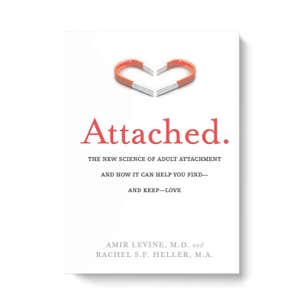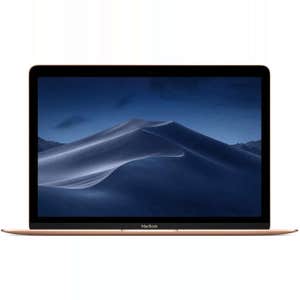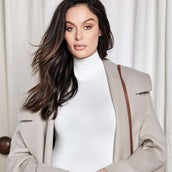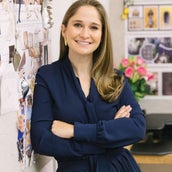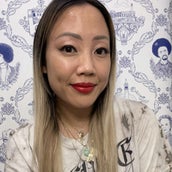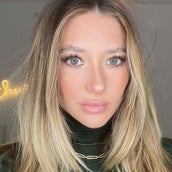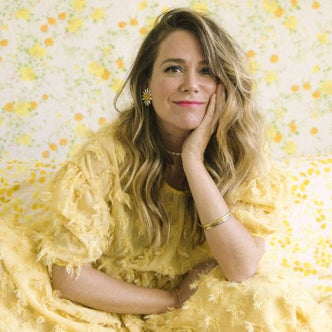
Welcome to Talking Top 10, a recurring series in which we feature the founders, CEOs, creators, and leaders who are shaking up their industries. Ahead, read our Q&A with Jen Gotch, and keep scrolling to shop her Top 10 must-haves.
Jen Gotch is genetically predisposed to optimism. She’s a visionary, a creative powerhouse and an advocate for mental health and emotional well-being. Jen also feels she would make a great crime scene investigator if her current career doesn’t work out. In 2008 she founded ban.do with a friend, and with no prior business experience, was able to transform it from a small hair accessories company into a beloved multimillion-dollar brand that’s all about encouraging joy and helping its community be their best. She remains as the Chief Creative Officer and fearless leader of the ban.do team. She also uses her authentic voice on Instagram and her podcast Jen Gotch is Ok...Sometimes to deglamorize success, remove the stigmas associated with mental illness, and build emotional intelligence—all while working to help her audience feel less alone. Her memoir The Upside of Being Down, published by Simon & Schuster, is now available for order and purchase where books are sold.
Keep scrolling to read more about Jen and shop her Top 10 must-haves, and don’t forget to follow @jengotch and @shopbando on Instagram!
All products and deals are sourced by the Rank & Style team using data and expert insights. If you shop through our links, we may earn a commission—at no extra cost to you.
March 30, 2020
R&S
Tell me about your career path before ban.do. What led you to start your own business?
Jen
I’ve had a very long and winding career path, all of which has very little to do with business. The most similar career I’ve had to this one was probably when I was doing food and prop styling and set design. I started to get into commercial photography because I had worked on sets for so long, and I was like “I think I maybe want to take the pictures now.” That was around the time that my friend and I started ban.do, and I was able to apply a lot of what I had learned to that. But ban.do really started as this crafty side project. We never intended for it to become what it became, but it was a very happy accident.
R&S
Ban.do once just sold hair accessories. How did the brand develop into what it is now?
Jen
We sold the brand in 2012 to a licensing company called Lifeguard Press. Jamie was moving out of state, and I didn’t feel like I would be able to run the business. In order to keep it going, we decided we’d try to sell it, and we literally had this match-made-in-heaven type sale. Licensing companies usually produce and sell products for other companies, so they worked with much larger brands at the time. But they wanted an in-house brand to come in and help do these things for them—a highly creative group of people with a brand voice and aesthetic, which was essentially what we had. Once they acquired us, we sort of shifted into the market that they’re in, which is basically the gift market. It was through that sale that we got exposed to all of these other avenues that we could apply our brand sensibility to.
View Jen's Essentials
R&S
What does a typical workday look like for you?
Jen
The days of typical workdays are over for me I think. For a long time, that looked like getting into work at 8:00 or 8:30, having back-to-back meetings all day, and leaving around 7:00. But I’ve aged out of that—I don’t think those days are sustainable anymore. We’ve grown a lot and there are so many more people on the creative team now and on the operations side too, so I have a lot more freedom now. Today, my day consisted of waking up in Joshua Tree, going thrift shopping, talking to you, and doing some work. They’re good days—they’re just more unique than they once were.
R&S
You’re big on spreading awareness about mental health, both on your personal Instagram and through ban.do. What led you to start doing this?
Jen
The evolution certainly was something that came off of the heels of my own personal programming. Talking about those things on Instagram was never really a decision—I’m just an open person when it comes to that, and I think over the years I’ve gained this level of comfort with it. Sometimes in order to process whatever I was going through, it just felt easier for me to get it outside of my body and into this other place where I could get a different perspective on it. It became such a positive thing in my life, and the type of feedback I was getting was so encouraging. There was just no way not to continue doing it.
I was really longing for ban.do to evolve into that too. Because—as you said—it’s always been the “fun” brand. And it still is incredibly fun, but I always felt like we were so much more than that and so much deeper than that—we just weren’t finding the avenues to articulate it. So we really started working on it a couple of years ago. With business and brands, it takes a long time to truly get an idea across to the consumer. We started prioritizing it, and now we really look at holistic betterment in general. So it’s not the idea of us just being a wellness brand—I don’t see it that way—it’s the idea that we can enrich people’s lives in lots of ways and do it through joy and information and inspiration. It was one of those processes that you wish would go faster, but then you look back and realize that the timing was actually perfect.
It all started with the Jen Gotch x Iconery necklace collection—that was really the thing that popped the bubble for ban.do. For a lot of people, it was a hard right. We went from giving people unicorn floats to giving them jewelry that spelled out words like “anxiety.” But it wasn’t a calculated thing—it was just an idea that came to me and we moved fast with it. I don’t think any of us really realized the impact that it would have. It was one of those ideas that just came through and we knew it was the right thing. That was the thing that just cracked it open for ban.do—to be able to operate in that realm.
I always like being a point of difference, and it’s a tough thing when you’re a brand and you’re a business and not everyone likes points of difference. On the idea of enriching people’s lives and wellness and betterment, I feel like we have a very consistent voice and aesthetic that occurs in that space with its no-holds-barred accessibility and pretty colors. My hope is that people might feel comfortable coming into that because it doesn’t feel quite as quiet. The products that we have created around that sensibility have done so well, and we could not be happier.
R&S
You’ve got a book coming out soon. Can you share a little bit about that?
Jen
I wanted to write a self-help book, but I was asked to write a memoir. So I think of it as a self-help memoir. It’s really just stories from my life and learnings from 48 years of being on earth, 20-plus years on a journey with mental health, and then my years in business too. Essentially, my touch-down on writing the book was to write something that would help a reader feel less alone in their own personal situations and encourage them to build emotional intelligence and self-awareness all through the lens of optimism. It’s called The Upside of Being Down, so it’s really about taking an optimistic approach to life regardless of what’s going on. It’s a little bit of everything. There’s a theme in my life that’s just potpourri.
R&S
What advice would you give to someone who’s looking to make a career switch?
Jen
I would say congratulations. Career switches can be very beneficial. The overarching thing for me has been the fact that your career doesn’t have to be a lifetime commitment. Following your passion is such a powerful thing, and it’s important to recognize that your passion can change at any given time. You don’t have to fall under the “This is what I’m going to be when I grow up,” and things end there. As someone who has had many careers and plans to have many more, I’m big on keeping it fluid, engaging, and rewarding and pivoting when those things stop being the case.
R&S
What’s your favorite item on ban.do right now?
Jen
We just came out with a wellness planner that is—in my mind—so epic. It’s the second volume of a wellness planner we created last year, and we collaborated with so many great contributors and artists. Going along with the idea of accessible wellness that feels very inspirational and fresh, this is just one of those products that does it so well. It’s similar to our other planners in that there’s so much packed in it and so much that reflects who we are. I’m just really proud of it. My participation in it was literally saying “We should do a wellness planner,” but I’m so proud of the girls that really dug in there and worked on it tirelessly to get it released. That’s hands-down my favorite thing at the moment.
R&S
Who’s been your biggest mentor throughout your career journey?
Jen
I’ve had many, many mentors. I never really was the type of person that was like “I should have a mentor,” but I probably should’ve been. Back when I was doing personal assistant stuff when I was working through my mental health issues and not fully equipped to take on an actual job, it was this woman named Dod. She was such a mentor for me, more than anything for how to be a good employer. I feel like she really shaped me into who I am as a boss today. Another one is a woman named Ursula who was an art director I worked with while I was styling. She’s just a creative genius. Her approach and attitude there really affected me most on the creative side of things. Business-wise, Todd Ferrier—the man in the husband-wife duo who owns ban.do now—was a huge mentor for me early on after we sold the business. He really taught me about business. The way that all of these people were mentors to me was so organic, and I don’t think I even noticed it was happening at the time. But reflecting back, they all had very meaningful effects on me.
R&S
What’s the most rewarding thing about your job?
Jen
For me, it’s two-fold. Being able to work with all of these women that are 10, 15, and even 20 years younger than me and feeling like I can affect their lives in a positive way, not just work-wise, but also just in general is so rewarding. Getting to see the girls who have worked for me so long grow creatively and professionally and watching them get better at things than me is so incredible. Nothing beats that.
On the consumer-facing side, and this applies to all of my quote-on-quote jobs, just knowing that sharing things—whether it's our intentions or [personal] thoughts and feelings—the effect that it has on people. I know it’s there because of the number of people who have told me so. It’s sometimes hard for me to absorb and grasp the impact of that. When I do let that sink in, it’s an incredible feeling.
R&S
What’s next for ban.do?
Jen
More of the same. We’re really leaning into this idea of holistic betterment—so that’s mental and emotional betterment, physical betterment, professional betterment, environmental betterment, spiritual betterment—and approaching the whole picture and the ways in which we’ll do that both online and in real life through our products. We’re focusing on the continuation of the evolution we started a few years ago, but it’s now sort of bubbled to the surface.
